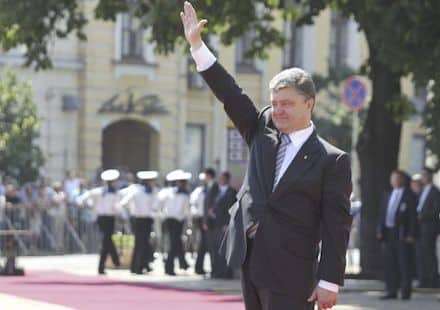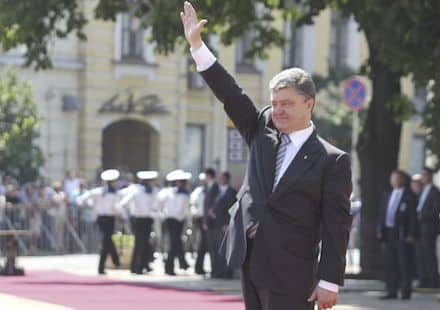
Washington is upping the ante in Ukraine. Kurt Volker, US Special Representative for Ukraine Negotiations, said in an interview with the Guardian published on September 1 that “Washington is ready to expand arms supplies to Ukraine in order to build up the country’s naval and air defense forces in the face of continuing Russian support for eastern separatists.” According to him, the Trump administration was “absolutely” prepared to go further in supplying lethal weaponry to Ukrainian forces than the anti-tank missiles it delivered in April. “They need lethal assistance,” he emphasized. Mr. Volker explained that “[t]hey need to rebuild a navy and they have very limited air capability as well. I think we’ll have to look at air defense.” The diplomat believes Ukraine needs unmanned aerial vehicles, counter-battery radar systems, and anti-sniper systems. The issue of lethal arms purchases has been discussed at the highest level.
The National Defense Authorization Act for Fiscal Year 2019 allocated $250m in military assistance to Ukraine, including lethal arms. The US has delivered Javelin anti-tank missile systems to Kiev but this time the ambassador talked about an incomparably larger deal. Former President Barack Obama had been unconvinced that granting Ukraine lethal defensive weapons would be the right decision, in view of the widespread corruption there. This policy has changed under President Trump, who — among other things — approved deliveries of anti-tank missiles to Kiev last December.
Ukraine has officially requested US air-defense systems. According to Valeriy Chaly, Ukraine’s ambassador to the United States, the Ukrainian military wants to purchase at least three air-defense systems. The cost of the deal is expected to exceed $2 billion, or about $750 million apiece. The system in question was not specified, but it’s generally believed to be the Patriot.
Volker’s statement was made at a time of rising tensions in the Sea of Azov, which is legally shared by Ukraine and Russia. It is connected to the Black Sea through the Kerch Strait. The rhetoric has heated up and ships have been placed under arrest as this territorial dispute turns the area into a flashpoint. Russia has slammed the US for backing Ukraine’s violations of international law in the area. According to a 2003 treaty, the Sea of Azov is a jointly controlled territory that both countries are allowed to use freely.
The US military already runs a maritime operations center located within Ukraine’s Ochakov naval base. The facility is an operational-level warfare command-and-control organization that is designed to deliver flexible maritime support throughout the full range of military operations. Hundreds of US and Canadian military instructors are training Ukrainian personnel at the Yavorov firing range.
NATO has granted Ukraine the status of an aspirant country — a step that is openly provocative toward Russia. Macedonia, Georgia, and Bosnia-Herzegovina are also aspirant nations. Last year, Ukraine’s parliament adopted a resolution recognizing full membership in NATO as a foreign policy goal. In 2008, NATO agreed that Ukraine along with Georgia should become a full-fledged member. In March, Ukraine, Moldova, and Georgia announced the formation of an alliance to oppose Russia.
The US is to render substantial military assistance to a country with an economy in the doldrums, reforms that have foundered, a democracy that is in question, and corruption that is widespread. It will be no surprise if those weapons fall into the wrong hands and are used against the US military somewhere outside of Europe. lIt was the US State Department itself that issued a report this year slamming Ukraine’s human-rights record. The UN human-rights commissioner tells the same story. So do human-rights monitors all over the world.
By supplying the weapons that Special Representative Volker talked about in his interview, the US will become an accomplice to a conflict that has nothing to do with its national security or interests. The situation in the Donbas is being used by Kiev to distract public attention from the country’s worsening domestic problems. But to Washington Ukraine’s government is the apple of its eye, “a bastard but it’s our bastard” that is ready to do what it’s told.
The move is provocative and it may have consequences. For instance, Russia could supply the self-proclaimed republics in eastern Ukraine with up-to-date weapons systems in quantities sufficient to deter any military action on the part of Kiev. Once the Minsk accords are no longer functional and cannot command obediance, Moscow could recognize those republics as independent states that are eligible for military cooperation agreements, which would include stationing military bases on their soil. If their governments invited the Russian armed forces to be deployed inside their borders, it would be quite natural to agree to those requests. No international law would be breached.
In a nutshell, if the US crosses that red line, Russia will act accordingly. Nobody seems to want a war raging in Ukraine, but that’s what the US weapons supplies would promote, egging the Ukrainian government on to seek a military solution. And what if it loses? Washington would be to blame for such a scenario. By the way, is it a coincidence that Mr. Volker’s interview appeared just as Alexander Zakharchenko, the leader of the Donetsk self-proclaimed republic, was assassinated? Just asking.
Reprinted with permission from Strategic Culture Foundation.

